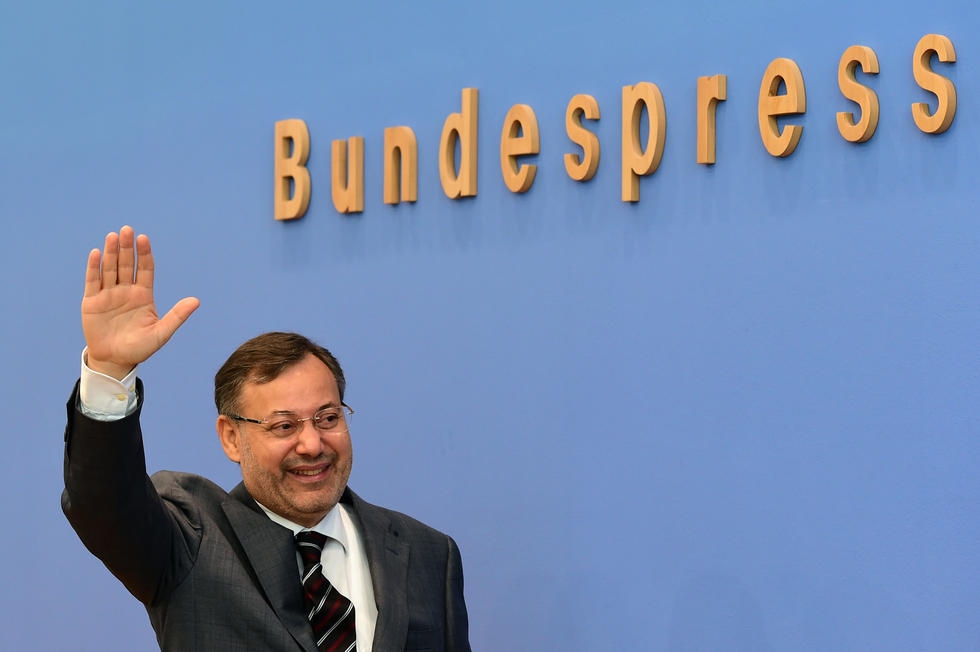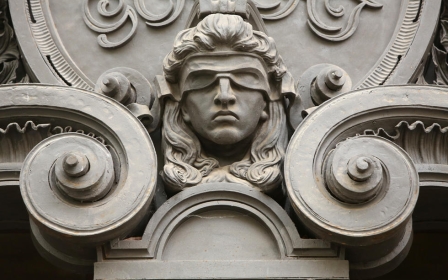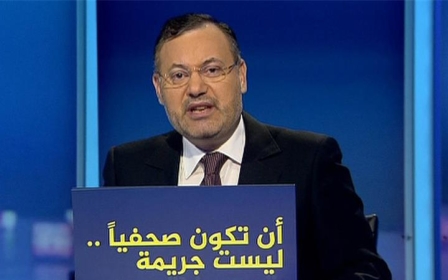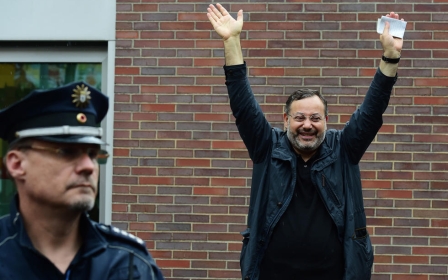Western collusion with Egypt’s reign of terror

Why was Al Jazeera journalist Ahmed Mansour, detained by German authorities under an Egyptian arrest warrant for three days, before being released without charge?
The popular Egyptian-British presenter, who hosts Al Jazeera’s Arabic-language show “Without Frontiers,” told a press conference this Tuesday that the German government had still failed to explain why he had been arrested and detained in the first place.
According to initial reports, German authorities had detained Mansour on the basis of an “international arrest warrant” and extradition request from Egypt. Of course, there is no such thing as an international arrest warrant.
Political decision
Those vague claims were followed by a more official explanation, put forward by a German government spokesperson, that the Egyptian arrest warrant came through via Interpol’s “red notice” system. In October 2014, Mansour was convicted in absentia – without trial – for the trumped up charge of torturing a lawyer in Tahrir Square in 2011.
But Interpol has confirmed that there was no such notice for Mansour, and had refused to issue the Cairo warrant.
Germany has not signed an extradition treaty with Egypt, and so is under no obligation to consider such a request. So why did Germany decide to accede to the request?
According to the German publication Zeit Online, before making its decision to arrest and detain Mansour, the German Federal Office of Criminal Investigation took the step of asking Germany’s Ministry of Justice and Federal Foreign Office to assess the case against Mansour. Only after those reviews was Mansour detained at Berlin’s Tagel Airport. There can be no doubt, then, that this was a political decision.
State of terror
In mid-2013, then military chief Abdul Fattah al-Sisi launched a coup against Egypt’s first democratically elected government under the presidency of Muslim Brotherhood leader Mohammed Morsi. By August that year, Sisi’s regime intentionally massacred 817 largely unarmed demonstrators protesting against the overthrow of Morsi.
But Sisi is not just targeting Brotherhood activists. His regime has also jailed secular activists, including some of the most prominent calling for liberal reform, for participating in “unauthorised” street protests.
So far, at least 2,600 people in total have been killed largely due to the repressive violence of Egypt’s domestic police and security forces, nearly half of whom have been Morsi’s supporters.
The targeting of Mansour by President Sisi’s regime is the latest in a long string of punitive measures against journalists, particularly against Al Jazeera, which Egyptian authorities accuse of being a front for the Muslim Brotherhood.
Peter Greste, along with two other Al Jazeera journalists, Mohamed Fadel Fahmy and Baher Mohamed, was arrested and detained by Egyptian authorities for news reporting that was “damaging to national security” in December 2013. Greste was also accused of being associated with the Muslim Brotherhood before receiving a sentence of seven years in prison, a charge he had described as “preposterous”. Greste was eventually released in February this year.
Eighteen journalists have been imprisoned in Egypt under Sisi, the highest number since 1990 according to the Center for the Protection of Journalists (CPJ), which concludes that the regime uses “the pretext of national security to crack down on human rights, including press freedom”.
Cashing in
None of this has prevented Germany from wanting to profit from Sisi’s junta since its blood-soaked arrival.
Earlier this month, Chancellor Angela Merkel told a news conference where she shared a platform with the former Egyptian military chief, “… there are things where we have a different opinion. That includes, for example, that under no condition should people be sentenced to death, even if it concerns terrorist activity”.
But she then added: “I think that if one wants to be partners and solve complex issues, we have to be able talk about these things ... this doesn’t mean that we can't work very, very closely on other issues.”
The German Federal Ministry of Economic Affairs and Energy promptly hosted the signing of an 8 billion Euro ($9 billion) deal for Germany’s technology major Siemens to build three natural gas plants and 12 wind farms in Egypt.
Just two weeks before Sisi’s visit to Berlin, Egypt sentenced ousted President Morsi and over 100 other Brotherhood leaders to death.
Merkel, however, had nothing to say about the 2,600 Egyptians who had already been murdered, mostly by the Sisi regime, without so much as a trial; or the more than 41,000 Egyptians arrested, indicted and sentenced according to Egyptian rights groups, including 300 lawyers, between July 2013 and May 2014; or Sisi’s use of the draconian 2002 Law on Associations to refuse civil society organisations’ applications for legal registration, and to then freeze their assets, block their funding, confiscate their property, and even shut them down wholesale.
Merkel also had nothing to say about the travel ban imposed by Sisi’s regime on Mohammed Lotfy, executive director of the Egyptian Commission for Human Rights and Freedoms (ECRF), which prevented him from travelling on 2 June from Cairo to Berlin to address a meeting in German Parliament on the grave human rights situation in Egypt. The roundtable would have coincided with al-Sisi’s official visit.
In a letter sent to Egypt’s public prosecutor, William Nicholas Gomes, a fellow at the University of York’s Centre for Applied Human Rights, wrote: “Lotfy was detained for several hours at the airport, and his passport was confiscated before he was permitted to return home. According to lawyers from the ECRF, state security informed Mohamed Lotfy that his passport was going to be passed on to the National Security Service (NSS). When the human rights defender asked if the travel ban followed a decision by the Public Prosecutor, an officer in civilian clothes explained to him that the ban was being imposed for “security reasons”. The human rights defender was also informed that he would be summoned for interrogation by the NSS at a later date.
The entire episode thus illustrates that far from the German-Egyptian energy partnership providing greater opportunities to address Egypt’s brutal repression against domestic dissent and free speech, it did the opposite – granting renewed impetus to Germany to act as a de facto extension of Sisi’s increasingly draconian police state.
Energy scramble
This is not surprising, given the wider geopolitical context of the German-Egyptian energy contract with Siemens. According to Sisi’s electricity minister, the deal is one among many being pursued with Western partners designed to alleviate the energy crunch in Egypt.
Egypt’s domestic conventional oil output peaked in 1996, and the decline in state revenues played a key role in forcing Sisi’s dictatorial predecessor, Hosni Mubarak, to slash food and oil subsidies, which exacerbated the price hikes and sparked domestic protests that culminated in the 2011 uprisings.
“Mr. Sisi sees the energy crisis in Egypt as a major risk to his presidency,” observes the Wall Street Journal, “with frequent power outages during the scorching summer months shaking public confidence in his administration of the nation.”
Clearly, Sisi’s Western benefactors agree. Two months ago, Egypt signed a big contract worth $12 billion with British Petroleum (BP) and another British energy firm, the BG Group, to develop Egypt’s offshore gas resources for domestic consumption. And a year ago, BG Group had signed a non-binding agreement with companies operating in Israel - Nobel Energy and Delek – to supply Israeli gas to Egypt for 15 years.
Industry sources confirm that Israel envisages exporting its gas to international markets through Egypt. An official document from Tony Blair’s Office of the Quartet Representative also shows that Western planners want Egyptian and Israel gas to supply power to the Occupied Territories, while untapped offshore gas resources in the Gaza Marine can be allocated to “gas sales” for export to other regional allies like Jordan.
So far, Egypt has signed a grant total of $158 billion worth of agreements and memoranda of understanding with international companies, many of which have focused on energy.
Apart from Germany, Britain and Israel, as of March 2015, Egypt has also signed a $1.8 billion deal with China to develop Egypt’s electricity transmission grid; a $2.4 billion deal with companies from Saudi Arabia and the United Arab Emirates to develop solar and wind power stations; a $7 billion deal with Saudi Arabia to develop a coal power station; a $5 billion deal with Italian oil major Eni to develop Egypt’s oil resources over four years.
‘Stability’ at the cost of democracy
Meanwhile, Sisi has appropriated the “war on terror” rhetoric of his Western benefactors to legitimise his brutal crackdown on political dissent and civil society activism.
Presenting himself as a bulwark of regional stability in the face of rising Islamist extremism, the West has rushed to shore up his tyranny primarily with energy contracts, but also, it seems, through direct collusion in Sisi’s domestic human rights abuses to crush political opposition.
The West has learned no lessons from the fall of Mubarak – except to keep doing more of the same.
A White House document submitted on 12t May, signed by Secretary of State John Kerry, supported the resumption of the US’ annual $1.3bn package of mostly military aid to Egypt, despite acknowledging Egypt’s lack of movement toward democracy and “negative” slide on human rights. The pretext was that it is “important to the national security interest of the United States”.
Accordingly, on the same day that Al Jazeera’s Ahmed Mansour was belatedly released without charge, the US announced that it had released $575 million in military aid to Egypt, mostly for existing defence contracts.
On the same day as this announcement, Sisi’s Minister of Interior, Magdy Abdel Gaffer, was meeting with US and British ambassadors to discuss “a number of security issues of common concern”. Britain’s Ambassador to Egypt John Casson emphasised Britain’s “readiness to cooperate with the Egyptian Interior Ministry to support efforts to combat the spread of extremism and tackle terrorist crimes which threaten the stability of countries across the world… We should not leave Egypt to face its challenges alone, but take tangible steps to partner with Egyptians who are building a more stable, more prosperous and more democratic country.”
An indication of how this is to play out can be discerned from Monday’s judgment of the UK’s Investigatory Powers Tribunal (IPT), which found that Britain’s equivalent of the NSA, Government Communications Headquarters (GCHQ), had spied on a number of human rights groups around the world, including the Egyptian Initiative for Personal Rights (EIPR). Privacy experts noted that the ruling suggested such spying was widespread against other human rights NGOs in Egypt and elsewhere.
So not only is the US supporting Sisi’s crimes against his own people with direct military aid, the West is shoring him up via lucrative energy contracts, as well as colluding with his police-state by persecuting journalists and spying on Egyptian human rights defenders – all in the name of that wondrous phrase, “national security”.
The West’s love affair with Egypt’s newest state-terrorist, however, is not going to result in “stability”. It will accelerate domestic grievances in Egypt, and vindicate calls for violence as the only way to challenge Sisi’s Western-backed dictatorship.
- Nafeez Ahmed PhD is an investigative journalist, international security scholar and bestselling author who tracks what he calls the 'crisis of civilization.' He is a winner of the Project Censored Award for Outstanding Investigative Journalism for his Guardian reporting on the intersection of global ecological, energy and economic crises with regional geopolitics and conflicts. He has also written for The Independent, Sydney Morning Herald, The Age, The Scotsman, Foreign Policy, The Atlantic, Quartz, Prospect, New Statesman, Le Monde diplomatique, New Internationalist. His work on the root causes and covert operations linked to international terrorism officially contributed to the 9/11 Commission and the 7/7 Coroner’s Inquest.
The views expressed in this article belong to the author and do not necessarily reflect the editorial policy of Middle East Eye.
Photo: Al Jazeera journalist Ahmed Mansour waves as he arrives for a press conference in Berlin on 23 June (AFP)
Middle East Eye propose une couverture et une analyse indépendantes et incomparables du Moyen-Orient, de l’Afrique du Nord et d’autres régions du monde. Pour en savoir plus sur la reprise de ce contenu et les frais qui s’appliquent, veuillez remplir ce formulaire [en anglais]. Pour en savoir plus sur MEE, cliquez ici [en anglais].





